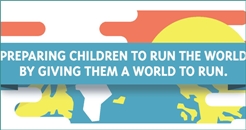 Micro-society schools
Micro-society schools
There's been a debate about whether schools are preparing pupils for work, real life, etc. An initiative which has been implemented in 40 US states, Africa, Bermuda, Canada, South America and South Korea may well be part of the answer.
MicroSociety is a powerful hands on learning environment that connects learners to an understanding of the global economy and social realities, encouraging them to think beyond the constraints of their classroom walls and into a 21st century context. It provides learners with a fun, compelling and practical way to connect their academic learning to the world around them. It prepares children to run the world by giving them a world to run.
With MicroSociety, school is society, a thriving, modern-day, mini-metropolis—complete with a government centre, entrepreneurial hub, non-profit organizations, consumer marketplace, university and community gathering spaces, created and managed by the students themselves and facilitated by teachers and community mentors. Student responsibilities and activities are embedded within seven MicroSociety Strands, each intentionally designed to connect societal activity and real world endeavors to standards.
Learning in a MicroSociety school occurs across four domains; Citizenship and Government, Economy, Technology and Humanities and Arts. During the classroom instructional part of the day, the job of each MicroSociety citizen is to build content area knowledge and develop the soft and hard skills, processes, and habits of mind needed to thrive in a civic and professional context.
Students spend six weeks in Micro Academy exploring citizenship and the building blocks of community. They write resumes and interview for jobs of their choice before receiving training at Micro University. Ultimately, students move from theory to application and for one period a day begin the process of creating and managing their own small town.
Together, students face authentic challenges that arise daily, experiment with a range of strategies for addressing them, and embrace failed attempts at risk taking until new solutions are found. In turn, these real world connections provide a meaningful platform for classroom learning.
Over the course of the school year, the society becomes progressively more sophisticated and students identify as accountable and able global citizens.
How does behaviour change? Here are some shifts:
Reading is driven by curiosity and relevance to job or position e.g. reporter, councillor.
A desire to convince, communicate, to be understood drives writing e.g. as consumers, constituents.
Profit and loss, data analysis, financial reports, spreadsheets, etc., drives maths
Civic responsibility is driven by citizen peers
Engineers and entrepreneurs solve problems by observing society and creating solutions.
Read more here
Retweet about this article:
Geoff Knott, 25/07/2018